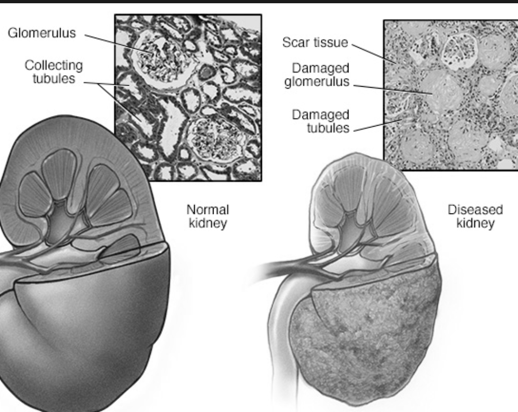High-dose Vitamin B1, or thiamine, may prevent or even reverse kidney damage in diabetic nephropathy, according to reports from British researchers.
A dosage of 300 mg thiamine per day for 3 months reduced the amount of albumin in the urine for type 2 diabetic patients in a recent study. Patients on placebo had no change. In another study, thiamine prevented the development of diabetic nephropathy in rats.
Diabetic nephropathy is the most common form of kidney damage that leads to end stage renal disease, or kidney failure, requiring dialysis or transplant. It develops slowly, and is thought to be caused by abnormal sugar levels in the blood. The main sign is abnormal protein in the urine.
The Recommended Dietary Allowance for thiamine is 1.1 to 1.5 mg per day. Thus, the dosage used in the albumin study was 200 times the amount considered necessary for healthy adults. A motivation for this study came from the observation that diabetic rats develop thiamine deficiencies even though their dietary intake is adequate for healthy rats. The researchers noted excessive losses of thiamine in the rats' urine.
A British research team did the following experiment to see whether thiamine can prevent the development of diabetic nephropathy in rats. First they induced diabetes in the test animals by injecting streptozotocin, an antibiotic that is toxic to the insulin-producing beta cells of the pancreas. Over the next 24 weeks, some of the rats received dietary supplements of thiamine and a thiamine monophosphate derivative. Rats with high-dose thiamine maintained healthy kidney function, while the rats without the supplements developed nephropathy.
In a related human study, thiamine excretion was found to be 16 times the normal amount in type 2 diabetics, and 24 times normal in type 1 diabetics. Both type 1 and type 2 diabetics had blood thiamine levels only 25% of normal. Researchers recommend that all diabetics take enough supplemental thiamine to prevent deficiency.
by Linda Fugate, Ph.D.
References:
Babaei-Jadidi R et al, “Prevention of incipient diabetic nephropathy by high-dose thiamine and benfotiamine”, Diabetes 2003; 52: 2110-2120.
Thornalley PJet al, “High prevalence of low plasma thiamine concentration in diabetes linked to a marker of vascular disease”, Diabetologia 2007 Oct; 50(10): 2164-70.
Rabbani N et al, “High-dose thiamine therapy for patients with type 2 diabetes and microalbuminuria: a randomised, double-blind placebo-controlled pilot study”, Diabetologia 2009 Feb; 52(2): 208-12.





Add a CommentComments
There are no comments yet. Be the first one and get the conversation started!